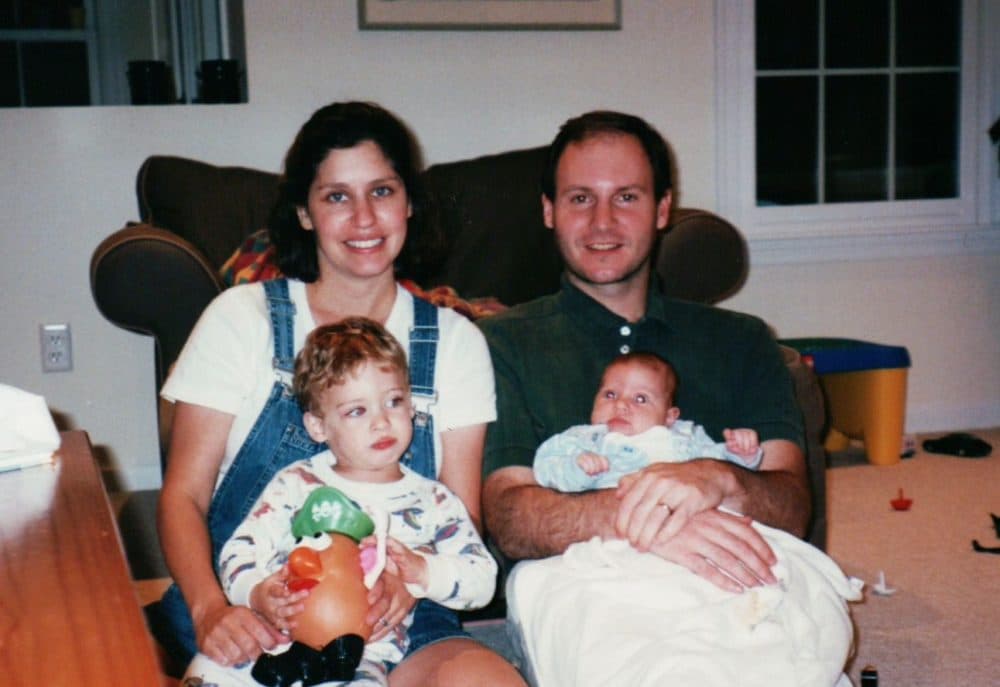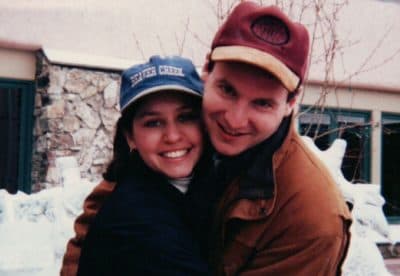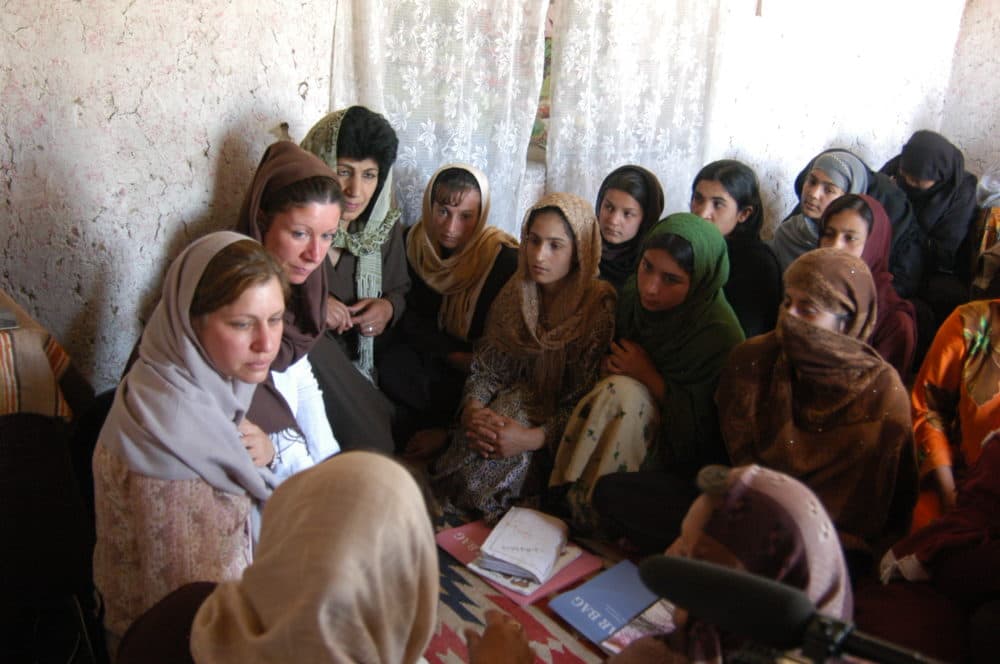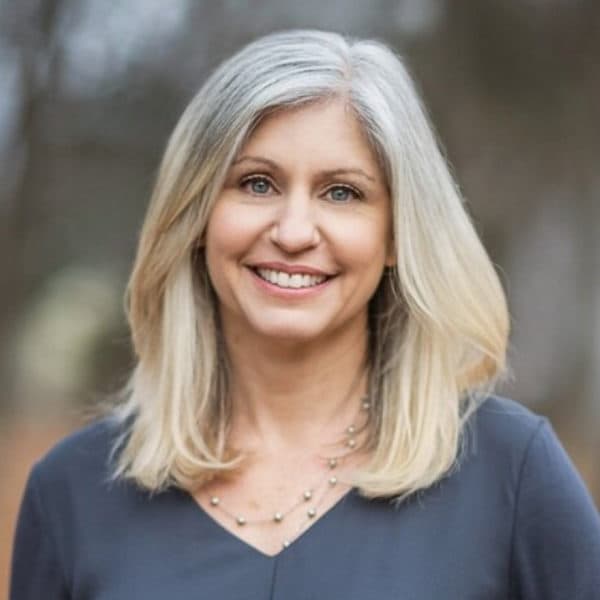Advertisement
Commentary
When My Husband Died On Sept. 11, I Found My Voice. And I Learned To Listen
Resume
Twenty years ago, my husband David was killed on 9/11. He was on American Airlines Flight 11, the first flight to hit the World Trade Center. At the time, we had two young children and I was pregnant with our third child. Dave and I were college sweethearts — madly in love — and we thought we had our whole lives ahead of us. The loss was devastating.
I was 33 years old when tragedy struck. To get through that time, I relied on friends and family and, perhaps unconsciously, I leaned into the doing of life — by keeping myself remarkably busy.
Our daughter was born in November, my sister and I wrote a children’s book in December, I got a puppy in January. And then, at some point in the winter of 2002, I decided that in June, I would hold the first annual “Dave Retik Father’s Day Fun Run.”
I had never even been to a “fun run” before, but I had it in my head that Father’s Day was going to be particularly difficult for our kids. I wanted to do something positive and honor Dave in the midst of all that grief. So, I sat down and made a list of who might attend — it came to about 50 names. Fast forward to the third Sunday in June; I stood in a mass of more than 1,000 people.
Just before the race began, it dawned on me that I should probably address the runners. Without any planned remarks or obvious staging area, I scaled a U-Haul truck, and as I looked out onto the sea of faces, young and old, some familiar, some not, a hush came over the crowd.

I had never done any public speaking before, and yet somehow, I had a feeling the right words would come. Back then, not even a year out from the attacks, the nation was reeling. There was a new war in Afghanistan. People were afraid, wondering what would happen next. The people assembled needed for me to be OK — to be hopeful, to be strong. That would give them permission to be OK, too. I don’t remember exactly what I said, but I do remember feeling the power of words — of my words.
I can’t recall many specifics about the blur of days after 9/11. What I do remember are the small kindnesses offered from every possible direction – the cards, and casseroles, coloring books for my young kids. Even in the earliest, most overwhelming days of widowhood, I never felt completely helpless. I knew I could begin making choices right away, to keep life as normal as possible for my children. My ability to choose — to have any good choices at all — motivated me to try to understand and support women a world away. Even to help just one woman, I thought, would be something. It would be a start.
Not long after that first Father’s Day, I co-founded a non-profit called Beyond the 11th. Our mission is to support and empower widows in Afghanistan. As I began learning about life for women under Taliban rule and specifically my counterparts — the young widowed moms — it broke my heart. It wasn’t only that they weren’t supposed to be seen, they were also not supposed to be heard. We used our voices to amplify theirs, and ultimately, to help give them their voices back.
In 2006, I visited Kabul to meet many of the women who were participating in programs that Beyond the 11th had helped fund. I have so many memories from that trip — the women’s kindness and generosity, the juxtaposition, everywhere, of modern and ancient life. The smells, the beauty, the devastation.

I remember one particular gathering. Twenty or so women greeted us with warm, open smiles. A few minutes later, when a man entered the room, swoosh — the Afghan women immediately covered their faces with their burqas and head scarves, even their hands. The man stayed, but eventually, when they felt safe, they began to show their faces again. It was so clear they wanted to be heard, their stories came tumbling out.
Change takes time, but there has been progress in Afghanistan. Millions of girls have been educated, maternal mortality has declined. More women have taken on public roles, as teachers, doctors, journalists, judges. All the education, knowledge, awareness — Afghan women own that now.
If the chaos and tragedy of Sept. 11 gave me a voice, it also gave Afghan women the opportunity to be seen and heard
It was gut-wrenching to see the last American plane leave Afghanistan. I know our work there isn’t done. In June, Beyond the 11th gave direct-cash-assistance to widow-led households of children attending the Zabuli education center. The school is still open, for kindergarten through 6th grade, and older students are expected back soon. Just a couple of weeks ago, we gave an emergency aid grant to CARE, an organization that has worked in Afghanistan since 1961. Those funds will help women-led households, especially, access humanitarian aid.
On this day 20 years ago, I was a full-time mom. I lived a normal, ordinary life. On Sept. 11, I was headed to the grocery store after pre-school drop off, when I heard on NPR that a plane had crashed into the North Tower. I remember sitting in the parking lot that morning, with the car still running, thinking: things like this don’t happen to people like me, but maybe I should run home and check Dave’s itinerary.
The attacks of 9/11 gave me an opportunity, a chance to pause, to recognize that my life would be different. I got to consider, Who am I? Who do I want to be? How do I want to move through this life?
If the chaos and tragedy of Sept. 11 gave me a voice, it also gave Afghan women the opportunity to be seen and heard. Their voices may be softer now, and harder to hear. But it’s our responsibility to keep listening.
